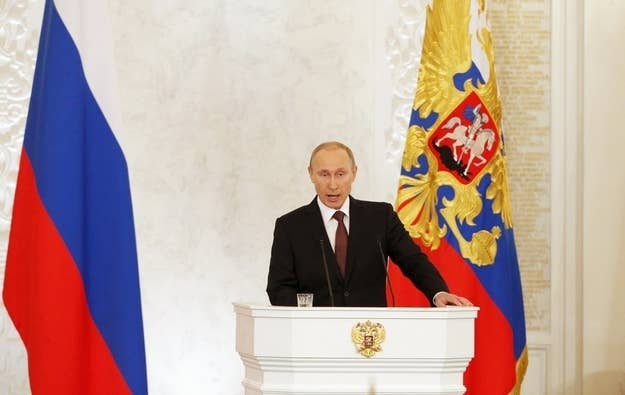
SEVASTOPOL, Crimea — Russian President Vladimir Putin announced Moscow would annex the breakaway Ukrainian province of Crimea Tuesday in an extraordinary speech uprooting the post-Cold War global order of the last 25 years.
With the whole of Russia's elite watching enraptured in the Kremlin, Putin signed an agreement with Crimean leaders allowing the peninsula to become part of Russia. The speech will doubtless be remembered, however, for the astonishing challenge Putin made to Western countries, asserting Russia's role as a bulwark against the dominance of the United States and Europe since the Soviet Union collapsed.
"They're trying to drive us into a corner because we're not hypocritical and tell it like it is," Putin said. "But there's a limit to everything. Today we need to stop the hysterics, reject Cold War rhetoric and recognize that Russia has national interests that need to be taken into account and respected."
In his speech, almost certainly the most significant of his 14-year rule, Putin flatly rejected international criticism of Russia's actions and rejected the Western hegemony of the post-Cold War era.
"Our Western partners, led by the United States of America, prefer to be guided by the principle that might is right in international politics," Putin said. "They have come to believe they are exceptional. They think that only they can be right."
"If you press the spring too hard, it will recoil. Russia has its national interests which you need to take into account," Putin added.
Though driven by February's revolution in Kiev that ousted former President Viktor Yanukovych, Putin's speech seemed born of decades of historical grievances against Russia's great power status. He railed against "the infamous policy of containing Russia that dates back to the 18th century." He said Crimea had been "stolen" from Russia after the collapse of the Soviet Union. He recalled the entire list of Russia's major disagreements with the West since he took power, starting with the NATO bombing of Yugoslavia and running through the Afghan and Iraq wars through to Kosovo's independence and the Ukrainian crisis.
Crucially, Putin claimed that Russia had no interest in annexing other provinces in Ukraine's Russian-speaking east and south — although he made a similar claim about Crimea two weeks previous that proved false. "Don't believe those who are trying to scare you with Russia," Putin said, addressing the Ukrainian people. "They say we want to break off other regions of Ukraine. We don't need that.
"Kiev is the mother of Russian cities. Ancient Rus is our common source. We cannot live without one another."
Putin has refused to recognize the new government in Kiev, which he says is made up of "usurpers" under the thumb of "nationalists, neo-Nazis, Russophobes, and anti-Semites" launching "terror" and "pogroms" against Ukraine's large Russian-speaking minority. Putin availed himself of the right to send troops to Ukraine, ostensibly to defend Russian-speakers, on March 1, but claims he has yet to do so despite the Russian soldiers seen all over Crimea.
Ukraine effectively lost control of Crimea in late February when thousands of Russian troops seized the province, a fact confirmed by a referendum Sunday in which 95% of voters opted to join Russia.
"Literally everything in Crimea is pierced with our pride and history," Putin said. "Crimea was and will remain an indelible part of Russia in people's hearts and minds."
Western governments and Ukraine have refused to recognize the referendum, which had no option to join the status quo and was held with numerous obvious procedural violations. The U.S. and the European Union announced separate sanctions lists Monday punishing Russia for approving the referendum, though they fell well short of going after key policymakers or attacking Moscow's economic interests.
Putin dismissed notions raised in recent weeks by U.S. and European officials that Russia's actions over Ukraine would come to hurt it. "I'd like to know what they mean. The actions of a fifth column of national traitors? We take statements like that to be aggressive and will respond to them in the proper manner."
